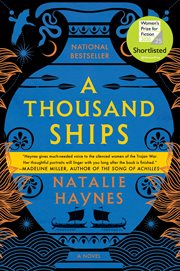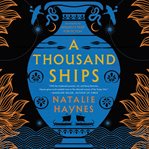Review by Booklist Review
"Sing, Muse," commands a poet, invoking inspiration for his Trojan War verse, but Calliope, goddess of epic poetry, has her own purpose in mind. She offers a tale not of the men's glory but of the experiences of the women. Except maybe Helen, who annoys her. Continuing her reimagining of the classics, Haynes (The Children of Jocasta, 2018) tells a witty, unapologetically feminist story of women's suffering, courage, and endurance, which demands that we reconsider our concept of heroism. Following a 10-year siege, Creusa, a young wife, wakes to see her city aflame. Other women of Troy wait along the shoreline to be parceled out as slaves to the Greek victors. Showing Haynes' comedic touch, Penelope writes letters to her husband, Odysseus, growing exasperated as she learns the reasons for his delayed voyage home to Ithaca. Some characters are familiar, others less so, including Oenone, Paris' abandoned wife. Cassandra's account is especially wrenching. The telling is nonlinear, but the varied stories flow naturally together, ensuring that readers won't lose their way. Haynes' freshly modern version of an ancient tale is perfect for our times.
From Booklist, Copyright (c) American Library Association. Used with permission.
Review by Publisher's Weekly Review
The women of the Trojan War take center stage in this excellent take on the Greek classics from Haynes (The Ancient Guide to Modern Life). Hopping through nearly a dozen perspectives, Haynes provides an enthralling reimagining of the lives of women from both Troy and Greek culture. There is Calliope, the muse who resents the poets demanding she supply them with inspiration; Andromache, who goes from princess to spoil of war when her husband, Hector, is killed by Achilles; and Penelope, who writes biting letters to Odysseus, asking him why it is that he doesn't feel any urge to come home to her and their son. There are also the royal heroines, such as Clytemnestra, who seeks revenge against Agamemnon for sacrificing their daughter; and Helen, who is weary of being constantly blamed for her role in beginning the war and for plots and prophecies she has no power to stop. Cassandra, cursed with prophesies no one will ever believe, struggles to function when she knows exactly what will become of her and her family after the war. Haynes shines by twisting common perceptions of the Trojan War and its aftermath in order to capture the women's experiences. Readers who enjoyed Madeline Miller's Circe will want to take a look. (Jan.)
(c) Copyright PWxyz, LLC. All rights reserved
Review by Library Journal Review
The story of the Trojan War is an old and familiar one. Here again are the Greek aggressors, the besieged Trojans, and the sneaky wooden horse. This time around, Haynes (The Children of Jocasta) focuses on the women--those left behind to await their husbands and sons and those who become enslaved after their men have been defeated. Prominent among them are Hecabe, the once proud queen of Troy, brought low by the loss of her husband and sons; her daughter Cassandra, cursed to foresee the future but thought too unstable to be believed; and Penelope, whose aggrieved letters to Odysseus, her long-lost husband, punctuate the drama. The long war is set in motion by one more woman, the earth goddess Gaia, whose arms can no longer bear the weight of the world and who decides that war is the best way to reduce the population. VERDICT If there is any need for one more trip down this well-traveled road after Madeline Miller's Circe and Pat Barker's The Silence of the Girls, this lively reinvention is worth the journey.--Barbara Love, formerly with Kingston Frontenac P.L., Ont.
(c) Copyright Library Journals LLC, a wholly owned subsidiary of Media Source, Inc. No redistribution permitted.


